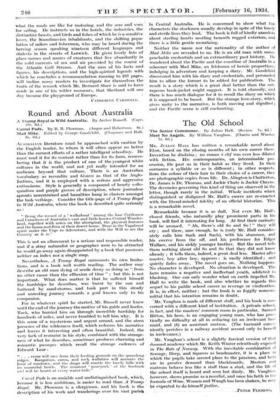Round and About Australia
A Tramp Royal in Wild Australia. By Archer Russell. (Cape. 10s. 6d.)
AUSTRALIAN literature must be approached with caution by the English reader, to whom it will often appear no better
than the earnest efforts of a rather intelligent schoolboy. He Must read it for its content rather than for its form, remem-
bering that it is the product of one of the youngest white cultures in the world, and not yet really intended for an audience beyond that culture. There is an Australian
*vocabulary as recondite and bizarre as that of the Anglo- Indians, and it is employed with a serious and aggressive enthusiasm. Style is generally a compound of hearty collo- quialism and purple groves of description, where journalese sprouts unrestrained and banalities hang in clusters amongst the lush verbiage. Consider the title-page of A Tramp Royal in Wild Australia, where the book is described quite seriously as : "Being the record of a ' walkabout ' among the lone Cattlemen and Cameleers of Australia's vast and little-known Central Wonder- land, together with notes on the aboriginal, the physical features and the fauna and flora of their desert home. Dope in the Vagabond spirit under the Urge to Adventure, and with the Will to see the Country as it is."
This is not an allurement to a serious and responsible reader, and if a stray naturalist or geographer were to be attracted Ile would go away again disappointed by a book that possesses
neither an index nor a single map.
Nevertheless, A Tramp Royal surmounts its own limita- tions, and is a book well worth reading. The author may
describe an old man dying of senile decay as doing so ", from no other cause than the effiuxion of time " ; but this is not important. What does matter is that he suffered himself the .hardships he describes, was burnt by the sun and battered by sand-stems, and took part in this steady and unresting journey towards a goal known only to his companion.
For in whatever spirit he started, Mr. Russell never knew until the end of the journey the motive of his guide and leader, Tuck, who hurried him on through incredible hardship for . hundreds of miles, and never troubled to tell him why. It is this sense of a mysterious and urgent errand, and the stern presence of the wilderness itself, which redeems his narrative
and leaves it interesting and often beautiful. Indeed, the verj, lack of restraint in his style, combined with the strange-
ness of what he describes, sometimes produces charming and romantic passages which recall the strange cadences of Edward Lear :
" . . . emus will race from their feeding grounds on the quondong ridges. Kangaroos, euros, and rock wallabies will animate the hour of sundown, and the dingo will startle the lonely hills with its mournful howls. The insistent morepork ' of the boobook owl will be heard at every water-hole."
ear:el Pads is an amiable and undistinguished book, which, ;b-ccause it is less ambitious, is easier to read than A" Trairip ' lkyal. Mr. Plowman is a clergyman, and his book is tfie • description of his work and wanderings over his vast parish in Central Australia. He is concerned to show what fine characters the stockmen usually develop in spite of the lonely and sterile lives they lead. The book is full of kindly anecdote about sterling hearts nestling beneath rugged exteriors, and there is a little gentle moralizing.
. Neither the name nor the nationality of the author of Mad Mike are revealed to us. He is an old man with unim- pea. chable credentials and an extraordinary past history. Ile wandered about the Pacific and the coastline of Australia in a schooner with Mad Mike, an Irishman of heroic proportions, indulging in adventure and keeping a diary. Mr. Goodehild discovered him with his diary and credentials, and persuaded him to allow the former to be edited for publication. The result is a story which is a great deal better than the out- rageous book-jacket might suggest. It is told clumsily, and there is too much dialogue for it to recall the diary on which it is supposed to be based. But the strange love-story, which gives unity to the narrative, is both moving and dignified ; and the Pacific scene is still enchanting.








































 Previous page
Previous page